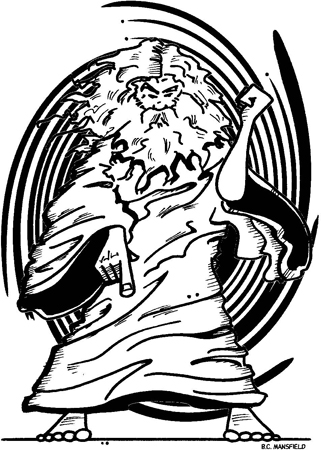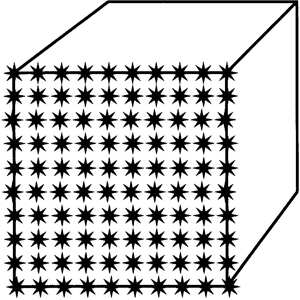

If [God] is omnipotent, then every occurrence, including every human action, every human thought, and every human feeling and aspiration is also His work; how is it possible to think of holding men responsible for their deeds and thoughts before such an almighty Being? In giving out punishment and rewards He would to a certain extent be passing judgment on Himself. How can this be combined with the goodness and righteousness ascribed to Him? The main source of the present-day conflicts between the spheres of religion and of science lies in this concept of a personal God.
—Albert Einstein, Out of My Later Years
You are with an extraterrestrial artist named Miss Muxdröözol.1 Muxdröözol, a trochophore with two huge teardrop-shaped eyes, has painted a biblical scene of the Tower of Babel using the blood of several ancestors.
You sometimes wonder about Miss Muxdröözol. Her skin is exceptionally smooth but her shape is somewhat disconcerting. She essentially has no body—just a large head connected to arms and legs. Sometimes the arms seem to retract behind the folds of her cloak.

You are telling her your ideas about God. “Miss Muxdröözol, moral truth is God’s will. Something is good because God desires it. Think of the Ten Commandments.”
She shakes her head. “No. That’s backwards. God desires it because it’s good. I can prove it.”
“No way!” You frown and then after a few seconds grin, although the smile doesn’t reach your eyes. “I thought I saw something.” But now you think the snakelike movement within the depths of her hair must be just a trick of the light.
“This?” Miss Muxdröözol asks as she moves her arm and a tangle of emerald light reflects against her face. Several gems are inlaid in her wrist.
Miss Muxdröözol seems as if she wants to tell you her personal theories about morals when, suddenly, a huge bearded man materializes in your room. For a second your mind is wracked by a series of ecstatic religious visions involving angels, Moses, and unleavened bread.
“I am God,” the being says. “You have tried to live a moral life. But you are wrong. My will is for you to kill movie stars, cheat on your taxes, lie whenever possible, steal from the poor, torture chinchillas and squirrels, spit daily on your neighbor’s car, slaughter the first born of races other than your own, and to drive a stake into Miss Muxdröözol’s cervical vertebrae. Please do this now.”
The being uses a long, wooden staff to project an image of a squirrel on the floor:

“Who the hell are you?” you say. “You are not God.”
“Why not?” The being’s beard trails along the floor. His eyes gaze at you with an intensity that transgresses the sanctity of the Silurian Epoch. Oh, those eyes.
“What you tell me to do is clearly wrong. You can’t be God, because no God would command such heinous acts.”
Miss Muxdröözol begins to evaginate her digestive tract through her oral cavity so that she can better see your face. “You see, I was correct. You could have decided that you were wrong about morality and that it was fine to torture chinchillas. This proves my point. Rather than concluding that something is good if God requests it, you first have an idea of what is good, and then you judge on this basis whether something represents the will of God.”2
MUSINGS AND SPECULATIONS
There is a theory which states that if ever anybody discovers exactly what the Universe is for and why it is here, it will instantly disappear and be replaced by something even more bizarre and inexplicable. There is another theory which states that this has already happened.
—Douglas Adams, Hitchhiker’s Guide to the Galaxy
Although the scenario with you and Miss Muxdröözol is as zany as they come, it does raise a good question: Do you think people conclude that something is good if God in the Bible requests it, or do we first have an idea of what is good, and then judge on this basis whether something represents the will of God?
What could a god do to make you believe he is God? I asked people on the Internet to answer this question in order to get a feel for what people think today. Sure, I admit the Internet is filled with people from all educational levels. I once had an editor who questioned why I wanted to hear the philosophical musings of taxi cab drivers. I told her that taxi cab philosophers told more about the universe, and contemporary thought, than Wittgenstein. Before you scoff, consider how you would answer the question I posed:
On a cool Autumn night, you are gazing up at the sky when a being suddenly appears and asks, “What can I do to make you believe that I am God?” What is your answer?
Here are some responses I received. If you, like some of my previous editors, are not interested in hearing from the Internet riffraff, skip the next few pages.
• You could ask Him to explain why He believed He was God.
• You could ask Him to find a rock He can’t lift, and lift it.
• First, ask the being to define what God is. Second, ask for five arguments—understandable to the best human minds—that provide testable evidence as to the existence of God. Finally, make sure that Stephen J. Gould, Martin Gardner, and Richard Dawkins would accept this evidence.
• Is it possible that there is no single act that could convince you that the being was God? Because anything God says or does could result from a sufficiently advanced technology, we could not know if God is merely some alien playing jokes on humans. However, if the entity is God, He should be able to adjust the nature of our brains so that we truly believe that the entity is God.
• To be convincing, ask this Being to hand you a book that you had written that argues convincingly that He is God.
• Perhaps God could demonstrate some “impossible” solution like solving Rubik’s cube from a well-mixed state in about 10 moves.
• The religion of Islam emphasizes that we only see God in His activities, which adapt His indescribable being to our limited understanding.
• In one of his more skeptical moods, the Italian theologian Saint Thomas Aquinas (1224–1274) wrote in Summa Theologica: “It seems that God does not exist; because if one of two contraries be infinite, the other would be altogether destroyed. But the name God means that He is infinite goodness. If, therefore, God existed there would be no evil discoverable; but there is evil in the world. Therefore God does not exist. Further, it is superfluous to suppose that what can be accounted for by a few principles has been produced by many. But it seems that everything we see in the world can be accounted for by other principles, supposing God did not exist. For all natural things can be reduced to one principle, which is human reason, or will. Therefore there is no need to suppose God’s existence.”
• You can’t disbelieve something if you don’t even know what it is you’re not believing in. Likewise, you can’t believe in something if you don’t even know what it is you’re believing in. This makes everyone an agnostic until or unless a definition of God is agreed upon.
• It is too late to be convinced. If You existed, I would have noticed it long ago.
• I’d say “Make me believe in you!”
• If in the next 30 seconds you can levitate me, make me ecstatically happy, and show me a convincing vision of the afterlife, then I will believe that you are God.
• Alter my brain. If my brain was altered the right way, I would believe God was God—no choice.
• Move an immovable object. Because this is paradoxical, I then expect the God-unit to enter an infinite loop (as they say in computer programming terminology), overflowing His stack, generating a kernel panic (or a “Blue Screen of Death”), followed by the emission of smoke, a small popping sound, sparks, flames, garbled speech. The total dissolution of space follows.
• If you’re God, why bother asking me? Testing me? Free will? Do you suffer from schizophrenia? Or just low self-esteem?
• I believe that Gödel’s Theorem has already disproved the existence of God because God cannot be omnipotent. Therefore, God would have to prove to me that Gödel’s Theorem is not valid.
• I do not want to truly believe in God. If I am given proof, then faith is impossible. Without faith, and hope, what reason is there to continue?
• One rational definition of God is “the whole of everything,” and this consciousness could evolve from the Internet. But I can see no way of giving the Internet, a communications medium with some computational ability, a “voice” and true consciousness.
• I think the answer may be suggested by Carl Sagan in the novel Contact. God would put pictures in the digits of pi or messages in DNA. But of course the entity communicating with the individual would need to prove that he is the author of the messages. As a paraphrase of what Arthur C. Clarke said about magic and technology, a sufficiently technologically advanced alien could easily pass himself off as God.
• This is too weird a question for me to answer. It implies a nature of God that I have found to be inaccurate. I know Spirit because Spirit exists, because life exists, because existence is. What does the question mean—what would make me believe in an all-powerful personality outside myself that controls the universe? Fear, insecurity, lack of perception. It’s happened before.
• To prove you are God, cease to exist.
• My answer would be that God can do nothing to prove that He is God. We can’t prove that anything around us is real. We could be in some computer-generated environment. In reality, we could be an alien being, transformed into a “human” by playing an advanced “computer” game. We could be living in a dream world.… You might not actually be reading this. You might be lying in a coma somewhere imagining this. No one can prove anything to me, and so God cannot prove that He is God.
• Continue being who you are.
• Proof denies faith, and without faith, I am nothing. God may very well be a tangible, quantifiable entity, but I think uncertainty is more fun. Nothing an entity could do would prove to me that he or she is God. I believe I would be able to judge for myself, without any parlor tricks. Any being who approached me with this question would have already broken my conditions for the qualities of God.
• I would never want to know whether or not God is real. God’s existence seems to be secondary to his purpose—bringing meaning and hope to peoples’ lives everywhere. And what is “real” anyway? Is what I taste and feel real? We perceive things because of electronic pulses and signals. Something is only as real as it can affect the perceivable world. If God can affect billions of people, his perceived existence is far more important than whether or not he actually exists.
• Nothing. God would never ask that question! He would know what I was thinking and just act as he wished upon my thoughts.
• Let me see you as you see yourself.
• I want to see how you created the universe.
• I would know that this being is not God. God would already know what it would take to make me believe.
• Prove all humanity as a collective is not God.
• I already know you are real.
• In the past, I have asked a variant of it to several people: “What could a being do to make you believe he is God?” I found that a skeptic’s answer is “Nothing.” No matter what evidence is presented, it can always be attributed to an alien, or aliens with superhuman intelligence, rather than a supernatural being like God.
That’s enough responses for now! Perhaps some readers have heard of the Turing test designed to determine whether a machine is genuinely thinking and “intelligent.”3 This is still a hot area of study among computer scientists. Humankind should also develop a similar test for advanced beings to determine if any of them are genuinely God. I welcome readers’ comments on what would be the most effective test.
* * *
Many years ago, I wrote a science fiction story about an astronomer named Kalinda. While gazing out into space using a powerful telescope, she saw the most startling arrangement of stars beyond the constellation Canis Major. She immediately picked up her phone and called her friend, a Dr. Carl Sagan, for advice and counsel. Both Kalinda and Sagan were stumped by the peculiar arrangement.
What Kalinda discovered with her new, powerful telescope was a perfectly arranged array of stars in the shape of a cubical grid. About ten stars formed each edge of the cube.

To confirm her initial observations, she decided to use the Hubble Space Telescope’s camera to more clearly resolve the star grid, which was located some seven billion light years from Earth. Because peering at distant stars is like looking back in time, the images revealed a star grid that existed when the universe was 60 percent of its current age.
If our scientists today discovered such a grid of stars, how do you think it would affect society and current scientific thinking? Would the artifact have religions repercussions? How would you react? Imagine what effect a similar arrangement might have had on the writers of the Bible if the arrangement were visible to the naked eye.
The perfect God understands that in order to be a good teacher, He must appear to humans to be an imperfect, learning God, open to mistake, argument, persuasion, and repentance.
—Alan Dershowitz, The Genesis of Justice
Just in terms of allocation of time resources, religion is not very efficient. There’s a lot more I could be doing on Sunday morning.
—Bill Gates, Microsoft cofounder and CEO, TIME